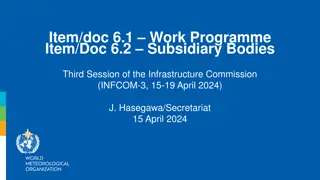
Smart Money Moves: Budgeting and Saving Strategies for Financial Stability
"Discover the importance of budgeting and saving money for financial stability, emergency funds, and long-term goals. Learn budgeting basics, saving strategies, and making wise financial decisions to secure your financial future."
Download Presentation

Please find below an Image/Link to download the presentation.
The content on the website is provided AS IS for your information and personal use only. It may not be sold, licensed, or shared on other websites without obtaining consent from the author. If you encounter any issues during the download, it is possible that the publisher has removed the file from their server.
You are allowed to download the files provided on this website for personal or commercial use, subject to the condition that they are used lawfully. All files are the property of their respective owners.
The content on the website is provided AS IS for your information and personal use only. It may not be sold, licensed, or shared on other websites without obtaining consent from the author.
E N D
Presentation Transcript
A future way beyond basic. Everybody Counts is a dynamic initiative from Team Kentucky that provides a clear pathway to success for qualifying seniors graduating from participating Kentucky school districts. The initiative benefits graduating seniors as well as businesses, local communities and Kentucky s economy. With Everybody Counts, everybody wins!
Why is budgeting and saving money important? Financial Stability: Budgeting helps you stay on top of your spending and ensures you have enough for essentials like bills, food, and fun. Emergency Funds: Saving creates a safety net for unexpected expenses, like car repairs or medical bills, so you don't have to borrow money. Long-Term Goals: Smart money management helps you reach future goals, like paying for college, buying a car, or moving out on your own. Saving now sets you up for success later!
Budgeting Basics Budgeting Basics Budgeting Basics Track Your Expenses: Write down everything you spend money on to see where your money is going. Know Your Income: Include any money you earn from a job, allowance, or other sources. Set Spending Limits: Break down your budget into categories like: Housing Transportation Food Entertainment Use the 50-30-20 Rule: 50% Needs: Essentials like rent, groceries, and bills. 30% Wants: Fun stuff like eating out, shopping, or hobbies. 20% Savings: Put this away for emergencies or future goals.
Saving Strategies Saving Strategies Set Savings Goals: Plan for short-term (buying a car) and long-term (college, starting a business) goals. Automate Savings: Set up automatic transfers from your checking to savings so you save without thinking about it. Start an Emergency Fund: Aim to save at least 3-6 months' worth of expenses for unexpected costs. Explore Savings Options: GET A FINANCIAL ADVISOR AND MEET AT LEAST ONCE A YEAR Savings Accounts: Safe place for emergency money. Certificates of Deposit (CDs): Higher interest, but your money is locked in for a set time. Investment Accounts: Grow your money for long-term goals (like retirement).
Making Wise Financial Decisions Making Wise Financial Decisions Making Wise Financial Decisions Know the Difference: Needs vs. Wants Needs: Essentials like rent, groceries, and transportation. Wants: Fun things like eating out or new clothes. Focus on needs first! Avoid Unnecessary Debt Don t spend more than you can pay back. Only borrow for things that add long-term value (like education). Understand Interest Rates Higher interest = more money you ll owe in the long run. Pay off credit card balances on time to avoid extra costs. Evaluate Your Spending Ask: Does this purchase help me reach my goals? Prioritize spending on things that move you closer to your financial goals.
Making Wise Financial Decisions Making Wise Financial Decisions Developing Healthy Financial Habits Practice Discipline & Self-Control Stick to your budget, even when tempted to overspend. Wait before making big purchases think, "Do I really need this?" Avoid Impulse Buying Take time before buying something you don t need. Make a list before shopping to avoid buying extras. Look for Ways to Increase Income Explore part-time jobs, freelance work, or side gigs to earn more. Invest in skills that can lead to better job opportunities in the future. Prioritize Long-Term Financial Security Save and invest for the future, not just for today. Focus on building an emergency fund and saving for big goals like college, a house, or retirement.


